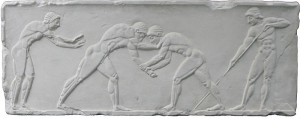Written for Aristomenes of Aegina, victor in the wrestling competition in 446 BC, this is the latest of Pindar’s datable odes. It is also widely considered his darkest: the aging poet, so the theory goes, depressed by thoughts of his own mortality, just couldn’t summon up an appropriately triumphal celebration–think of Mozart in the valley of the shadow of death, furiously scribbling his own Requiem. But Mozart was a much younger man, while this ode, it seems to me, is full of the clear-eyed wisdom of age. It perceives that defeat and victory, darkness and light, death and life are as interdependent and intertwined as eight limbs locked in a wrestling match; with Heraclitus, it affirms us “mortal immortals, immortal mortals, living our death and dying our life.” Pindar finds the source of the splendour of triumph in its very transience. The eighth Pythian ode is one of his most profound and powerful productions; here are the last two strophes:
Chris Childers
ὁ δὲ καλόν τι νέον λαχὼν
ἁβρότατος ἔπι μεγάλας
ἐξ ἐλπίδος πέταται 90
ὑποπτέροις ἀνορέαις, ἔχων
κρέσσονα πλούτου μέριμναν. ἐν δ᾽ ὀλίγῳ βροτῶν
τὸ τερπνὸν αὔξεται: οὕτω δὲ καὶ πίτνει χαμαί,
ἀποτρόπῳ γνώμᾳ σεσεισμένον.
ἐπάμεροι: τί δέ τις; τί δ᾽ οὔ τις; σκιᾶς ὄναρ 95
ἄνθρωπος. ἀλλ᾽ ὅταν αἴγλα διόσδοτος ἔλθῃ,
λαμπρὸν φέγγος ἔπεστιν ἀνδρῶν καὶ μείλιχος αἰών:
Αἴγινα φίλα μᾶτερ, ἐλευθέρῳ στόλῳ
πόλιν τάνδε κόμιζε Δὶ καὶ κρέοντι σὺν Αἰακῷ
Πηλεῖ τε κἀγαθῷ Τελαμῶνι σύν τ᾽ Ἀχιλλεῖ. 100
But one who gains some new success Ant. 5
on wings of soaring manliness
and splendid hope takes flight 90
toward future deeds, for he has caught
a passion beyond wealth. In no time man’s delight
bursts into bloom, but just
as fast collapses in the dust,
shaken by a breeze, a shift in thought.
One day we live. What is someone? What is no one? A dream Ep. 5
of a shadow is all we are. But when the heavens shed their gleam,
our life grows sweet and light shines over us.
Dear mother Aegina, safeguard this city’s
voyage of freedom, with Zeus and with King Aeacus,
and Peleus, and noble Telamon, and with Achilles.
Read more of this text at the Perseus site.
Links
Chris’ full versions of Olympian 1 and Pythian 8 are available from Arion www.bu.edu/arion


No Comments